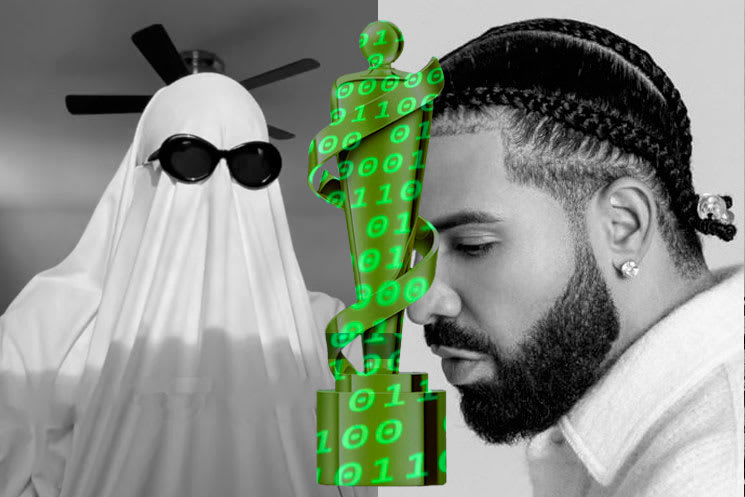After the Grammys went back and forth about whether to consider "Heart on My Sleeve" — the AI-generated quote-unquote collaboration between Drake and the Weeknd that went viral this spring — in the Best Rap Song and Song of the Year categories, Canada's own JUNO Awards has landed where the US Recording Academy eventually did, too: these top honours should be for art made by actual humans.
Of course, the internet-storming, discourse-prodding track was made by an actual person, though; they go by the name ghostwriter online and, to the understanding of most, are not Canadian. Another key differentiating factor of JUNO eligibility is that "Heart on My Sleeve" is claiming to be something it isn't.
"It's 'Drake and the Weeknd' — but that's not them," Allan Reid, president of the Canadian Academy of Recording Arts and Sciences, told the Canadian Press. "That is not their voices; those are AI-generated voices."
The JUNOS has introduced new AI eligibility rules to lay the basic foundation of how the technology can be used in creating music. Eligible recordings can use artificial intelligence — so long as it's not the "sole or core component." Reid admitted that exactly what this means was still a bit open to interpretation in this "learning year" for the awards.
"We want to make sure that we have humans being recognized," he added. "We can't be awarding an AI project a JUNO."
A song made with Vancouver-born Grimes's AI vocal service would present a more complicated scenario. The recording would most likely be ineligible, given that the vocals are AI-generated. But, according to Reid, if it was produced by a Canadian human, the awards would have to take "a deeper look" at the case.
Submissions for the 2024 JUNO Awards open on Monday (September 18).
Of course, the internet-storming, discourse-prodding track was made by an actual person, though; they go by the name ghostwriter online and, to the understanding of most, are not Canadian. Another key differentiating factor of JUNO eligibility is that "Heart on My Sleeve" is claiming to be something it isn't.
"It's 'Drake and the Weeknd' — but that's not them," Allan Reid, president of the Canadian Academy of Recording Arts and Sciences, told the Canadian Press. "That is not their voices; those are AI-generated voices."
The JUNOS has introduced new AI eligibility rules to lay the basic foundation of how the technology can be used in creating music. Eligible recordings can use artificial intelligence — so long as it's not the "sole or core component." Reid admitted that exactly what this means was still a bit open to interpretation in this "learning year" for the awards.
"We want to make sure that we have humans being recognized," he added. "We can't be awarding an AI project a JUNO."
A song made with Vancouver-born Grimes's AI vocal service would present a more complicated scenario. The recording would most likely be ineligible, given that the vocals are AI-generated. But, according to Reid, if it was produced by a Canadian human, the awards would have to take "a deeper look" at the case.
Submissions for the 2024 JUNO Awards open on Monday (September 18).
